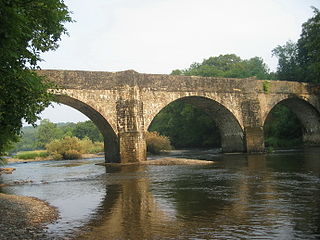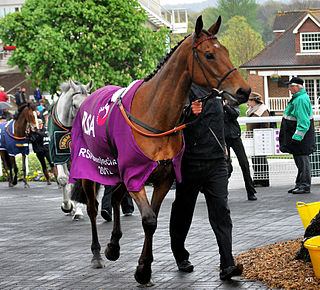Related Research Articles
In horse racing in the United Kingdom, France and Republic of Ireland, National Hunt racing requires horses to jump fences and ditches. National Hunt racing in the UK is informally known as "jumps" and is divided into two major distinct branches: hurdles and steeplechases. Alongside these there are "bumpers", which are National Hunt flat races. In a hurdles race, the horses jump over obstacles called hurdles; in a steeplechase the horses jump over a variety of obstacles that can include plain fences, water jump or an open ditch. In the UK the biggest National Hunt events of the year are generally considered to be the Grand National and the Cheltenham Gold Cup.

The Cheltenham Gold Cup is a Grade 1 National Hunt horse race run on the New Course at Cheltenham Racecourse in England, over a distance of about 3 miles 2½ furlongs, and during its running there are 22 fences to be jumped. The race takes place each year during the Cheltenham Festival in March.

The Cheltenham Festival is a horse racing-based meeting in the National Hunt racing calendar in the United Kingdom, with race prize money second only to the Grand National. The four-day festival takes place annually in March at Cheltenham Racecourse in Cheltenham, Gloucestershire. It usually coincides with Saint Patrick's Day and is particularly popular with Irish visitors.
The Ladbrokes Trophy is a Grade 3 National Hunt steeplechase in Great Britain which is open to horses aged four years or older. It is run at Newbury over a distance of about 3 miles and 2 furlongs, and during its running there are twenty-one fences to be jumped. It is a handicap race, and it is scheduled to take place each year in late November or early December.
The Arkle Challenge Trophy is a Grade 1 National Hunt steeplechase in Great Britain which is open to horses aged five years or older. It is run on the Old Course at Cheltenham, England, over a distance of about 2 miles, and during its running there are thirteen fences to be jumped. The race is for novice chasers, and takes place each year during the Cheltenham Festival in March.
The Champion Hurdle is a Grade 1 National Hunt hurdle race in Great Britain which is open to horses aged four years or older. It is run on the Old Course at Cheltenham over a distance of about 2 miles and ½ furlong, and during its running there are eight hurdles to be jumped. The race is the last leg of the Triple Crown of Hurdling and is scheduled to take place each year on the opening day of the Cheltenham Festival in March.
The 2005 Cheltenham Gold Cup was a horse race which took place at Cheltenham on Friday 18 March 2005. It was the 77th running of the Cheltenham Gold Cup, and it was won by the pre-race favourite Kicking King. The winner was ridden by Barry Geraghty and trained by Tom Taaffe.
The 2000 Cheltenham Gold Cup was a horse race which took place at Cheltenham on Thursday 16 March 2000. It was the 73rd running of the Cheltenham Gold Cup, and it was won by Looks Like Trouble. The winner was ridden by Richard Johnson and trained by Noel Chance. The pre-race favourite See More Business finished fourth.
The 1999 Cheltenham Gold Cup was a horse race which took place at Cheltenham on Thursday March 18, 1999. It was the 72nd running of the Cheltenham Gold Cup, and it was won by See More Business. The winner was ridden by Mick Fitzgerald and trained by Paul Nicholls. The pre-race favourite Florida Pearl finished third.
The 1997 Cheltenham Gold Cup was a horse race which took place at Cheltenham on Thursday 13 March 1997. It was the 70th running of the Cheltenham Gold Cup, and it was won by Mr Mulligan. The winner was ridden by Tony McCoy and trained by Noel Chance. The pre-race favourite Imperial Call pulled-up before fence 18.
The 1994 Cheltenham Gold Cup was a horse race which took place at Cheltenham on Thursday 17 March 1994. It was the 67th running of the Cheltenham Gold Cup, and it was won by The Fellow. The winner was ridden by Adam Kondrat and trained by François Doumen. The pre-race favourite Jodami finished second.
The 1991 Cheltenham Gold Cup was a horse race which took place at Cheltenham on Thursday March 14, 1991. It was the 64th running of the Cheltenham Gold Cup, and it was won by Garrison Savannah. The winner was ridden by Mark Pitman and trained by Jenny Pitman. The pre-race favourite Celtic Shot finished seventh.
The 2009 Cheltenham Gold Cup was a horse race which took place at Cheltenham on Friday March 13, 2009. It was the 81st running of the Cheltenham Gold Cup, and it was won by the pre-race favourite Kauto Star. The winner was ridden by Ruby Walsh and trained by Paul Nicholls.

Nantgaredig is a village in Carmarthenshire, Wales. It is about 4 miles (6.4 km) east of the county town of Carmarthen on the A40 in the parish of Llanegwad. the Population was around 524 as of the 2011 census.
Horse racing in Wales has a long tradition dating back to the 18th century. Wales has held flat racing, National Hunt and harness racing, and presently has three racecourses, at Chepstow, Bangor-on-Dee and Ffos Las. The Welsh Grand National is held annually at Chepstow between Christmas and New Year and is the highlight of the Welsh racing calendar.

Bobs Worth was an Irish-bred, British-trained Thoroughbred racehorse. He won the Albert Bartlett Novices' Hurdle in 2011, the RSA Chase in 2012 and the Cheltenham Gold Cup in 2013 at the Cheltenham Festival, making him the first horse since Flyingbolt in the 1960s to win three different races at consecutive Cheltenham Festivals. In 2012, he also won the Hennessy Gold Cup at Newbury. Bobs Worth was trained by Nicky Henderson, owned by the Not Afraid Partnership.
The 2015 Cheltenham Gold Cup was the 87th annual running of the Cheltenham Gold Cup horse race and was held at Cheltenham Racecourse on Friday 13 March 2015.
Norton's Coin was a British Thoroughbred racehorse, best known for his 100/1 win in the 1990 Cheltenham Gold Cup. He was an obscurely-bred gelding owned and trained in Wales by Sirrell Griffiths, a dairy farmer who had only two other horses in his stable.
Brendan's Cottage (1930–1940) was a British Thoroughbred racehorse who won the 1939 Cheltenham Gold Cup. After beginning his career in flat racing he developed into a top-class steeplechaser and won the Gold Cup by defeating the odds-on favourite Morse Code. He never won again and died a year later at the age of 10.
Roman Hackle was a British Thoroughbred racehorse who won the 1940 Cheltenham Gold Cup. After winning several races over hurdles he was switched to steeplechasing in 1939 and made an immediate impact by winning the Broadway Novices' Chase. In the following year he won the Gold Cup as a seven-year-old but did not build on his early promise. In two subsequent bids for the Gold Cup he ran poorly when favourite in 1941 and fell in 1942. His British career ended when National Hunt racing in Britain was suspended in September 1942 but he went on to win races in Ireland.
References
- ↑ Legends of Welsh Sport, BBC 2022
- 1990
- news.google.co.uk/newspapers – New Straits Times – March 17, 1990.